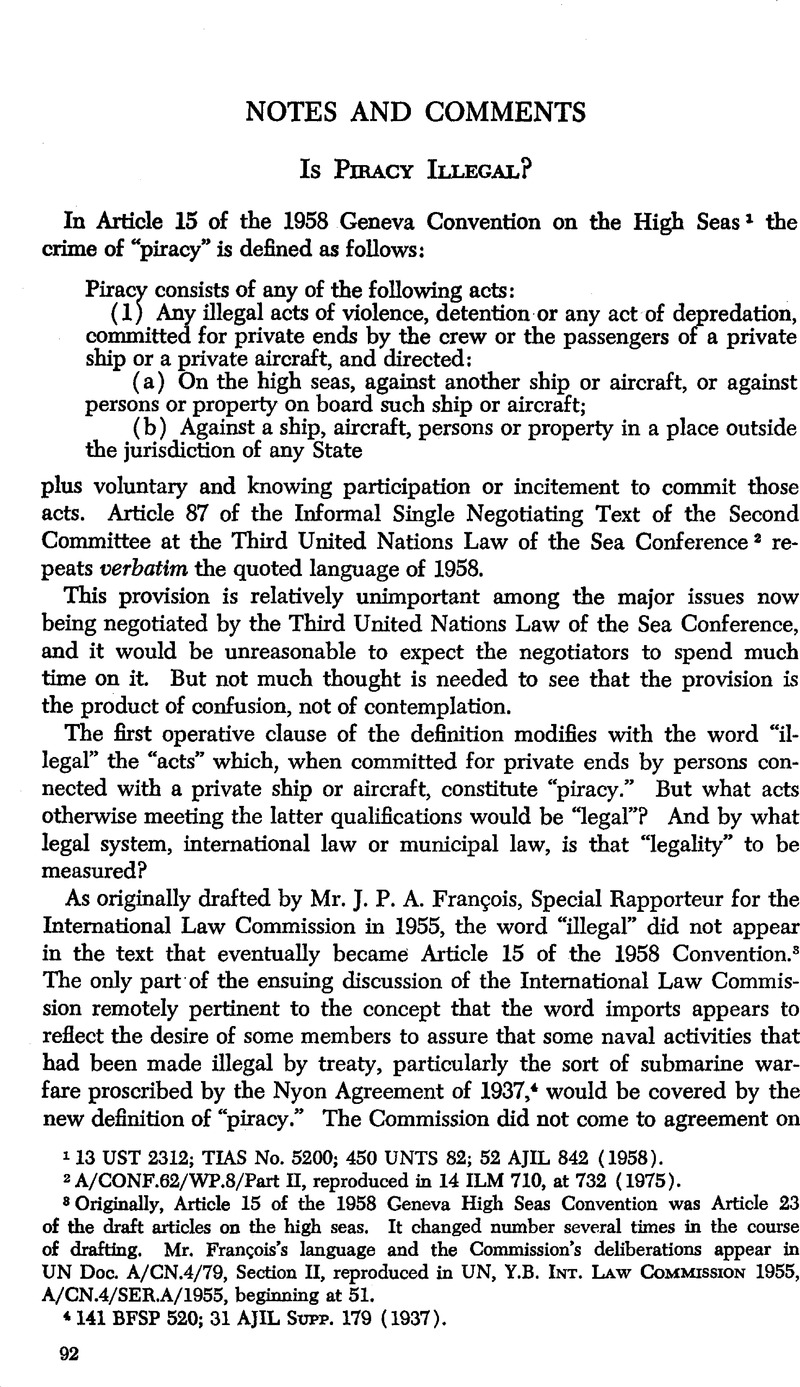Published online by Cambridge University Press: 27 February 2017

1 13 UST 2312; TIAS No. 5200; 450 UNTS 82; 52 AJIL 842 (1958).
2 A/CONF.62/WP.8/Part II, reproduced in 14 ILM 710, at 732 (1975).
3 Originally, Article 15 of the 1958 Geneva High Seas Convention was Article 23 of the draft articles on the high seas. It changed number several times in the course of drafting. Mr. François’s language and the Commission’s deliberations appear in UN Doc. A/CN.4/79, Section II, reproduced in UN, Y.B. Int. Law Commission 1955, A/CN.4/SER.A/1955, beginning at 51.
4 141 BFSP 520; 31 AJIL Supp. 179 (1937).
5 UN, Y.B., supra note 3, at 228.
6 UN Doc. A/2934, also contained in A/CN.4/A/1955/Add.l, at 19.
7 UN Doc. A/CONF.13/L.62. The proposal was rejected by 4 votes to 30 with 16 abstentions. UN Doc. A/CONF. 13/40, at 84. McDougal and Burke, The Public Order of the Oceans, 811–12 (1962), note the Greek proposal and the "curious" wording, but seem to conclude from the "background of discussion at the [1958] Conference" that the word "illegal" is a harmless redundancy.
8 The Declaration of Paris, 1856, 46 BFSP 26; 1 AJIL Supp. 89 (1907): "1. Privateering is, and remains, abolished." An excellent summary and bibliography of the history of "private reprisals," including privateering, is in Sohn & Buergenthal, International Protection of Human Rights 23–40 (1973).
9 These legal terms, "belligerency" and "armed conflict not of an international character," have great significance in defining the rights and obligations of rebel bands. Cf. comments by Professor R. R. Baxter in Trooboff (ed.) Law and Responsibility in Warfare 63 (1975). But this is not the place to analyze these legal' labels. See the useful bibliography in Schwarzenberger, A Manual of International Law (5th ed. 1967) beginning at 550.
10 The Ambrose Light 25 F.408 (1885). See also the correspondence regarding "Haytian insurgents" (1869) and The Huascar (1877) in 2 Moore, International Law Digest 1085–87 (1906); 1 McNatr, International Law Opinions 272 (1956).
11 There was substantial contemporary dissent to the view of law implied in those parts of the Huascar and Haitian correspondence involving the use of the label "piracy." See Moore, 1087, and McNatr, 279, 280, supra note 10. There are ample precedents directly contrary to The Ambrose Light. See, e.g., R. v. Tunkoo Mohamed Saad and ors. (1840) 2 Kyshe (Cr.) 18, reprinted in 1 Parry and Hopkins, Commonwealth International Law Cases 31 (1974). See also the report of the Santa Maria incident in 4 Whtteman, Digest of International Law 665–66 (1965). A massive compilation of material is The Harvard Research in International Law at 26 AJIL Supp. 743 et seq. (1932). For a study of the use of the label "piracy" to justify political action, and the ineffectiveness of that label after the 1870's, see Rubin, Piracy, Paramountcy and Protectorates (1974) passim.
12 See UN Doc. A/CONF.13/L.83. The proposal was defeated 13 to 22 with 7 abstentions. UN Doc. A/CONF.13/40 at 84. The merit of the proposal would be obvious to anybody reading fie Piracy Jure Gentium [1934] A.C. 586 (P.C.), which is precisely to the point, scholarly, and has never been disputed as to substance. In that case an unsuccessful attempt at "piracy" was held itself to be piratical despite the inclusion of participation and incitement in the influential Harvard draft published a short time before (see supra note 11) and the fact that "attempts" are not mentioned in that draft.